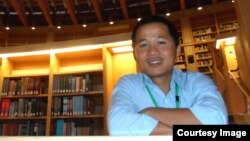As Cambodia seeks greater integration with regional and global economies, a language expert warns against overreliance on foreign identity and language.
Chan Virak, a doctorate student in culture, literacy and language at the University of Texas at San Antonio, says Cambodia should invest in its own language, by developing higher education curriculum, in order to preserve its identity.
The danger, he says, is that by investing too heavily in other languages (and cultures), such as English, native Khmer will be undermined.
“To me, learning many languages is not a problem, but the problem is when we [overvalue] them,” he said in a recent interview on "New Voices". “Normally, when we learn a new language, we are also influenced by its cultural and economic forces.”
Cambodia’s working language has been influenced by outside forces since its colonization by the French. Aside from its native Khmer, the country has seen major influence from French, English, Vietnamese and Russian. Much of its post civil war development centered around English, and these days more and more people are learning Chinese, as investment comes from that country.
Khmer remains the language of instruction for many higher education programs, but Chan Virak said an increasing number are using English or Chinese. Without a careful policy, there is a danger of “foreignization” of Cambodian values.
“Cambodians who study English not only learn the language, but at the same time start to value the socio-economic status of English-speaking countries,” he said.
This kind of cultural pressure will only increase as Cambodia seeks greater integration with the economies of Asean and the world, he said.
These days, universities are considering the job market and student preferences when they decide on a language of instruction. Some are locally oriented, using Khmer. Others are internationally focused and taught in English.
VOA Khmer asked its Facebook users whether they would like to see bilingual policies at universities. Many echoed Chan Virak’s concerns, saying an increase in the use of English could erode the value of Khmer language.
English could be used as a second language, user Sokha Smos Sne said. “But some schools use foreign language as the main language, thus devaluing and endangering the use of Khmer itself.”
Facebook user Heng Rithy questioned the role of English in Cambodia’s development, pointing to Japan’s lack of English proficiency relative to its development.
Chan Virak agreed, saying that Japan can be a model for Cambodia. Students need to prioritize the languages that help them get good jobs after graduation. He encouraged them to attend job fairs to understand the job market before making a decision.
But he also said a choice of language should not come at the cost of Cambodia’s own language and culture. He suggested Singapore as a good model in the region, where English is the professional language but where Chinese, Malay and Tamil are all are part of the national fabric.
As part of the New Voices radio show's requirement for guests to suggest a good reading material for audience, Chan Virak suggested “Golden Bones” by Cambodian-American Sichan Siv. For success tips he suggests young Cambodians to identifying clear life goals and passions.








